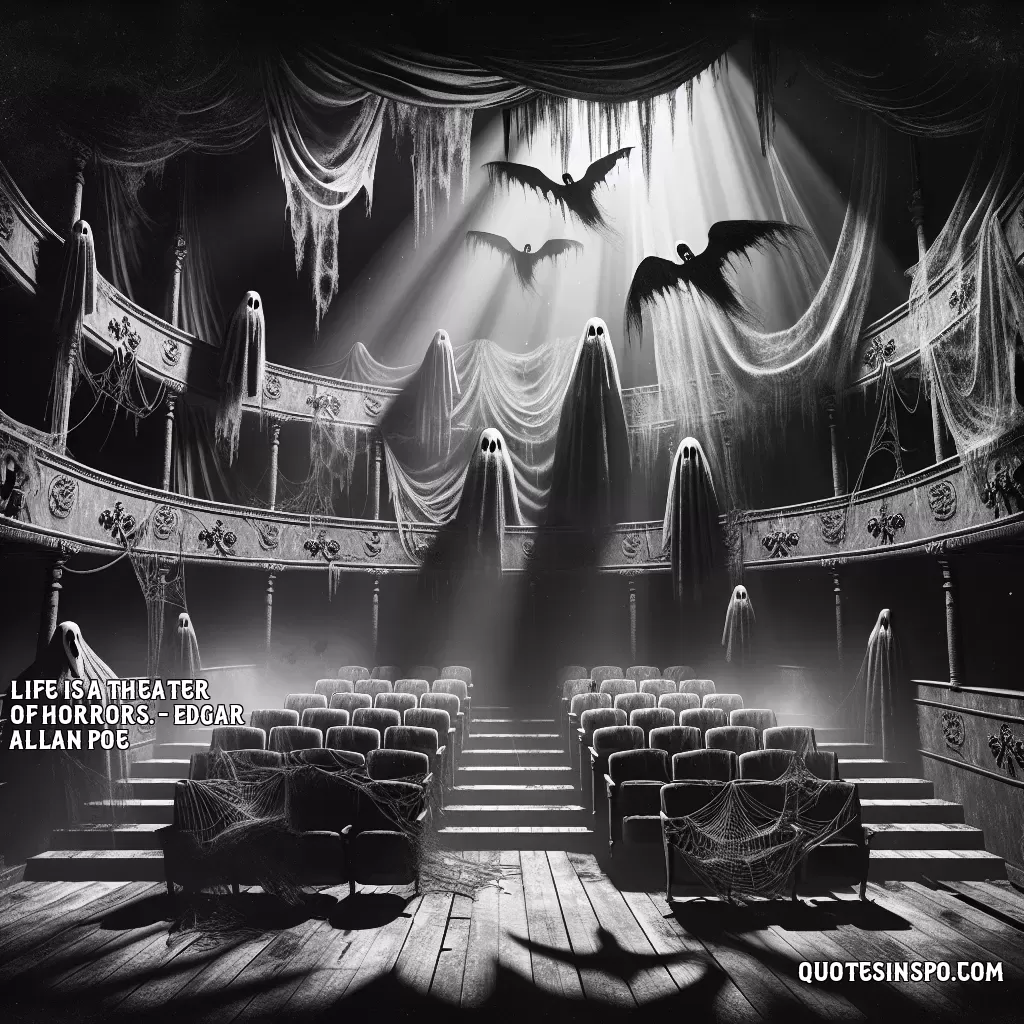
Life is a theater of horrors. - Edgar Allan Poe
The quote "Life is a theater of horrors" by Edgar Allan Poe captures the somber and Gothic essence of his worldview. To understand this quote, one must first appreciate Poe's literary style, which often delves into the macabre, the mysterious, and the psychological turmoil inherent in the human experience. At its core, this quote suggests that life unfolds like a theatrical performance filled with horrifying and tragic events. The metaphor of "theater" implies that life is a scripted drama of sorts, where human beings play out their roles amidst an inevitable backdrop of pain, suffering, and chaos. Just as an audience watches a horror play with both dread and fascination, Poe might be suggesting that we, too, are spectators and participants in the distressing events around us. Poe, known for his exploration of dark themes, recognizes that horror is not merely relegated to supernatural entities or physical monstrosities—it is deeply embedded in the complexities of human emotions, the unpredictability of fate, and the inevitability of mortality. This quote reflects the existential view that life encompasses not just joyful moments but also inescapable suffering, much like the alternating acts of a play. By acknowledging life's horrors, Poe invites us to confront the darker aspects of our existence. In doing so, we not only gain a deeper understanding of ourselves and the world but also perhaps find some semblance of solace in the shared experience of life's inevitable tragedies.
Quote By: Edgar Allan Poe
Edgar Allan Poe was an American writer, poet, editor, and literary critic, born on January 19, 1809, in Boston, Massachusetts. Widely regarded as a central figure in American literature, Poe is best known for his contributions to the genres of horror and gothic fiction. His life was marked by tragedy and hardship, which deeply influenced his work and themes.
Poe was orphaned at a young age when his father abandoned the family and his mother died of tuberculosis when he was only three years old. He was taken in by John and Frances Allan, a wealthy couple from Richmond, Virginia, although he was never formally adopted. This tumultuous relationship with his foster father, particularly over financial matters and Poe’s literary ambitions, led to a strained and contentious atmosphere in his upbringing.
Despite the challenges he faced, Poe pursued a career in writing and began publishing poetry at a young age. His first major work, "Tamerlane," was released in 1827, but it was his later tales, such as “The Tell-Tale Heart,” “The Fall of the House of Usher,” and “The Cask of Amontillado,” that solidified his reputation as a master of macabre. Edgar Allan Poe’s work often explored themes of death, decay, and the human psyche, showcasing his ability to delve into the darker sides of existence.
Poe also made significant contributions to the development of the short story as a literary form and is credited with pioneering the detective fiction genre with his story “The Murders in the Rue Morgue.” His literary criticism was sharp and influential, earning him a position as editor at several prestigious magazines.
Tragically, Edgar Allan Poe’s life was marred by personal difficulties, including struggles with alcoholism and the loss of loved ones. He died under mysterious circumstances on October 7, 1849, in Baltimore, Maryland. Despite his turbulent life, Poe's legacy endures, and his works continue to be celebrated for their imaginative quality and psychological depth. Edgar Allan Poe remains an iconic figure whose influence on literature and culture can still be felt today.